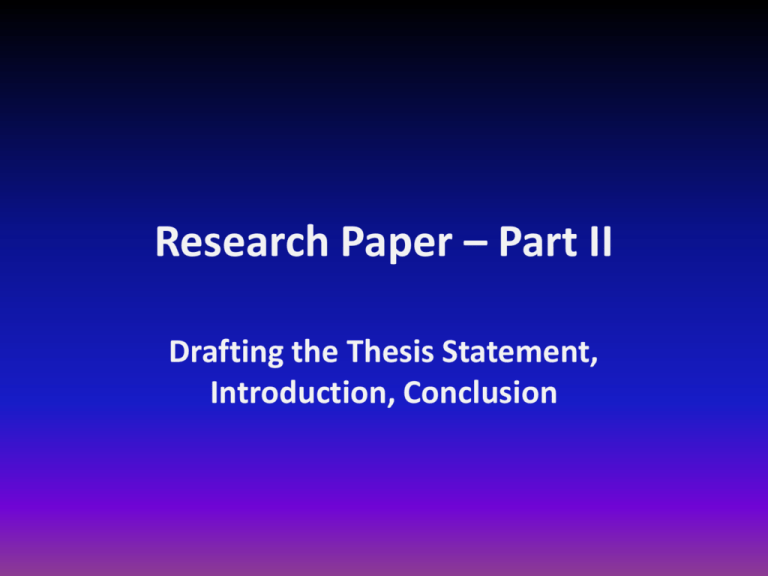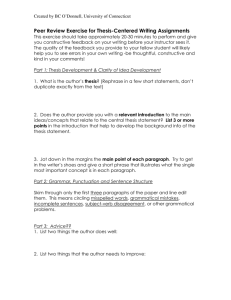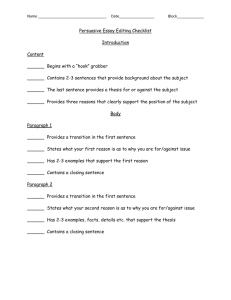Research Paper – Part II
advertisement

Research Paper – Part II Drafting the Thesis Statement, Introduction, Conclusion What have you done so far? • You’ve read your short story, hopefully. • You have written down the basic plot elements and mapped the story. • You have pulled out quotes that help support your thematic statement. (THESE ARE BOTH FROM YOUR STORY & FROM YOUR RESEARCH) • Now, we just need to figure out how to get started writing! Part II – Drafting a Thesis Statement • Make sure you include literary elements in your thesis statement. If you don’t use elements, you are headed for a PLOT SUMMARY, not an ANALYSIS! The Good, The Bad & The Ugly • Good – Through the use of foreshadowing, characterization and symbolism, Agatha Christie ultimately shows the untrustworthiness of most people in the novel, And Then There Were None. • Bad –Alan Paton describes the setting very well in order to make his story exciting. • Ugly – I am going to write an analysis of Agatha Christie’s really awesome novel, And Then There Were None. Perhaps this Skeleton will help… In the short story, “____________________” (title), __________________(author) ______________________ (strong verb: satirizes, mocks, revolutionizes, disapproves of, asserts, predicts, warns against, embraces, etc.) __________________________(theme, does not include specifics from the work) through ___________________________________( specific literary element or elements, setting, characterization, etc). Try WRITING YOUR OWN THESIS STATEMENT NOW! Remember, this is only a skeleton, so feel free to SPICE it UP! Congratulations! Now for the Introduction! • Begin by identifying the work and the author • You may do this by introducing the time period, the genre, or specific conflicts that drive the work • Then give a little insight into the plot of the story. • Then lead into your thesis statement (NOTICE – The introduction always begins vague or general and gradually becomes more specific) Conclusion • Look at your thesis statement • Reword the thesis to close out your essay. • Offer a statement of the effectiveness of the story as it relates to the theme. Topic Sentences • Topic Sentences are the first sentence of every paragraph (after the introduction) • They let the reader know what the paragraph will be about! • Using your thesis, write one sentence for each paragraph EXAMPLE: Through the use of characterization, one is able to see Chopin’s link between her female lead character and the theme that women of Chopin’s time face oppression and crave freedom. (The next paragraph will have a different literary device). What you should now have… • Thesis statement • Three topic statements – (You should be able to write three very different paragraphs, even if you have chosen the same literary element each time) • Introduction & Conclusion • Keep all of this. We will use it to draft our outlines. • COMPUTER LAB TOMORROW! PLEASE FIND YOUR NAME ON THE SEATING CHART!





